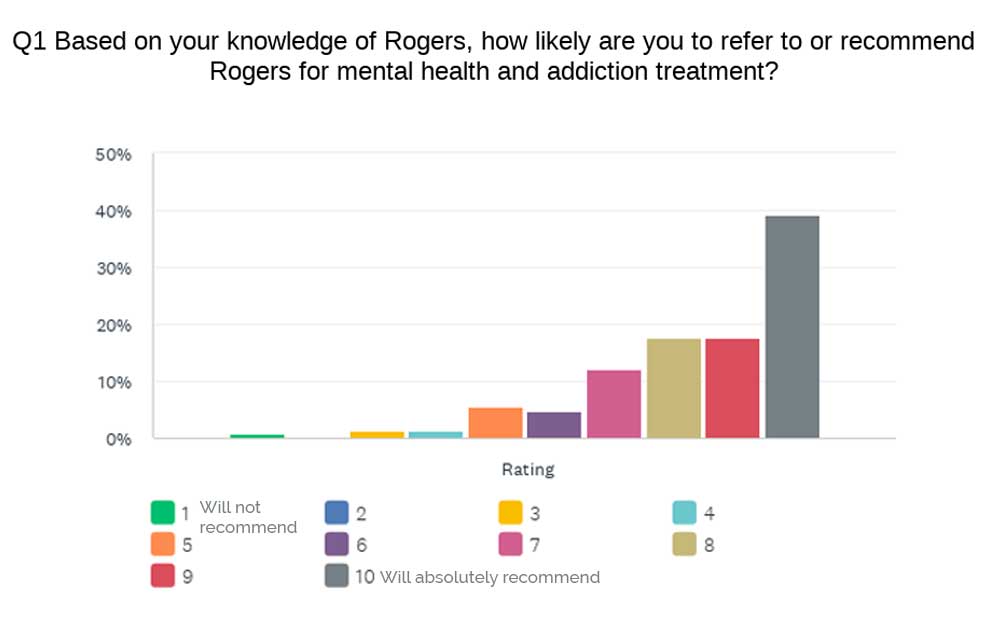
Community partners give high rates of satisfaction, site areas for improvement in annual survey
04/16/24 02:00:pmResults from an annual referring provider survey show an in increase in overall satisfaction. A record 1,442 referring providers from 34 states took the opportunity to rate their satisfaction with Rogers and recommend areas of improvement.
Overall, 57% of respondents chose a 9 or 10 out of 10 on the Net Promoter Score, indicating they are highly likely to refer or recommend Rogers for specialty behavioral health treatment. The score is a 3% increase over last year.
“More than 96% of our community partners report being satisfied or highly satisfied with Rogers’ services,” says Genevieve Fraser, senior director of strategic alignment and business intelligence. “This is a testament to the quality of care, which is impacted by every team member. From our clinical staff, admissions, environment of care teams to support services, we all contribute to how patients and families experience our care.”

Genevieve credits new initiatives with increasing satisfaction.
“Over the past year, teams have worked on streamlining access points across the System to ensure people receive treatment when they need it,” she explains. “Rogers has focused on what specific communities need and how we can expand services to meet that need. The creation of Primary Behavioral Health and Outpatient Services for medication management and psychiatric evaluations, as well as the expansion of Mental Health and Addiction Recovery and telehealth, all reflect the commitment we have to the communities we serve.”
Considering other survey results of note, less than 7% of referring providers reported dissatisfaction with the referral and admissions process, with 48.8% reporting a positive experience. The highest satisfaction in treatment and outcomes by age is with treatment for children, followed by adolescent and then adult.
Why respondents trust Rogers
The top reasons respondents gave for referring to Rogers include the evidence-based treatment we provide, relationship with a community relations liaison, colleague or professional contact, and their client’s insurance being accepted.
Suggestions for areas of improvement
Respondents say Rogers’ biggest opportunities for improvement center around communication during treatment and discharge planning coordination.
“The importance of the annual referent survey is to hear honest feedback from our community partners regarding areas where we’re doing well and where we can improve,” Genevieve says. “When providers refer a potential patient to our care, they want to continue communication throughout the individual’s treatment with us so they can provide meaningful clinical insight as well as support recovery once a patient is discharged. Each location is receiving the survey results specific to their clinic. From these reports, clinical and operational leaders will establish action items outlining how we will improve communication during treatment and coordination at discharge.”
Positive and constructive feedback
Rogers received nearly 500 comments to two open-ended questions. The first question asked how Rogers can better meet the needs of referring providers and their patients. Here’s a sampling of what they shared:
“As a school professional, I’ve appreciated that your school rep reaches out to us when a student is admitted. It’s helpful to be invited to a discharge meeting for each student as well so all can plan support together.”
“I had no concerns. The treatment and outcomes have been wonderful!”
“I think Rogers is doing great! I haven’t had any clients who I’ve needed to refer to higher levels of care, but if I did, Rogers would be one of my recommendations.”
“As a case manager who needs updates for case management purposes (driver safety plans), it is hard to get in contact with the actual treatment provider for these quick updates.”
“As a school professional, communication between school and Rogers is essential. There have been times we have not been updated that a student has entered or discharged. Please continue to communicate with us so we can better support the students when they return.”
“I think the best way Rogers can better meet my/the needs of my patients is by focusing on communication. From my perspective, being able to speak with members of the team at Rogers about a client of mine is helpful in terms of seeing their perspective which provides additional information and context.”
“I love the services you offer and feel confident my clients will leave much better off than they started. For certain PHP/IOP programs, I understand clinicians are busy and don’t have much time, but I do really value at least one call during PHP, and one during IOP/discharge so I can better understand what led to gains for my clients, any new insights, and what skills were most helpful. It would be a need in the community to offer a program focused on specific treatments for emergent adults or failure to launch.”
Comments on care for diverse patients
The second open-ended question asked referents how they believe patients view Rogers and any barriers they may cause them to hesitate to refer them to us. Of those who responded, 59% selected none or not applicable, while 20% said their patients had a positive experience. Here’s a sampling of what they shared:
“Based on trainings offered and taken by me, I am confident that LGBTQIA+ and BIPOC clients would be treated appropriately and with respect.”
“Continuing focus on trans-affirming care for youth is something I find important. Rogers does great at this, and I have no reason to think that will change! That said, it’s always good to keep values alive and not rest on laurels (which Rogers has not done at all), which is the ONLY reason I even bring it up :)”
“I appreciate a recent webinar in which cultural competency was discussed in the context of trauma treatment.”
I really appreciate your sensitivity to this because my company has a very strong emphasis on diversity, equity, and inclusion and respects all people.
“One of the clients I referred to Rogers is nonbinary and First Nations. My understanding is that they had a positive experience.”
“I know I struggle with my Spanish-speaking population whenever they’re looking for services. This also would be an issue when other language speaking families are involved and do not know how to communicate in English fluently.”
“Children and people receiving care at Rogers have never had any complaints about feeling valued and accepted in my 25 years of contact.”
Genevieve’s team is working on a plan to stay in close contact with our community partners.





